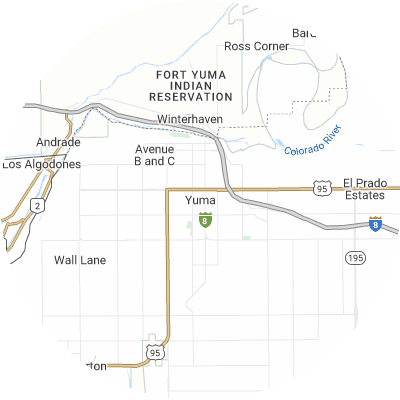Please enter a valid 5-digit zip code!
Written By David Cusick
Last Updated April 2024
Solar energy is becoming increasingly popular for Yuma homeowners. A new solar energy system can help you add value to your property, provide a dependable source of power, and decrease your carbon footprint. Solar power can reduce your energy costs and lower your carbon footprint. However, it's important to hire a qualified solar installer. That’s why, after properly vetting providers, we assembled a guide to the most trusted solar companies in Yuma. These providers offer high-quality service.
Informative resources
Clear pricing policy
Reliable customer support
Free quotes
Services Offered
Free quotes
Clear pricing policy
Informative resources
Family-operated business
Reliable customer support
Services Offered
Informative resources
Reliable customer support
Clear pricing policy
Free quotes
Services Offered
Clear pricing policy
Free quotes
Informative resources
Reliable customer support
Services Offered
Clear pricing policy
Free quotes
Reliable customer support
Services Offered
Today's Homeowner looks at dozens of datapoints on solar companies to come up with our data-driven rankings. It's not possible for a company to pay for preferential treatment in our rankings. We look at the following key factors in determining who should top our list:
Adopting solar power lets homeowners lower utility bills while helping the environment by reducing your carbon footprint using clean energy. If you’re determining whether to go solar, consider these key factors for choosing an installer.
Make sure you hire a licensed solar installer. This help guarantee that the work is done correctly using the most up-to-date installation methods. The Arizona Registrar of Contractors issues specialty licenses for solar PV and thermal contractors. To install solar PV systems, a contractor must be a licensed electrician, and for solar thermal systems, they must be a licensed plumber.
Check review sites like the Better Business Bureau (BBB), TrustPilot, and Google Reviews to see feedback from past customers on local solar companies. Detailed reviews can help you evaluate a company's dependability and customer service. Use caution with companies that have barely any reviews or mostly negative ones.
Call at least three solar companies for free, itemized quotes. These quotes should describe all costs and specify the solar equipment included. Reviewing multiple quotes helps you find the option that aligns with your budget.
Top-notch solar installations should come with strong workmanship and performance warranties. A workmanship warranty covers installation defects, such as cracks in the panels, poor alignment, or poor wiring. A performance warranty ensures a minimum energy output. Comprehensive guarantees show that a solar company believes in its work.
Switching to solar power can help reduce your energy expenses over time. Be sure to consider these aspects when determining the cost and value of solar panels.
In Yuma, solar panels cost an average of $3,070 per kilowatt, with an average system size of 5.1 kilowatts. The typical Yuma homeowner spends $10,983 on their solar array after federal tax refunds. An estimate from a local provider will consider additional information reflecting your desired system's required preliminary work, size, panel type, and capacity. In some cases, homeowners may prefer leasing solar panels to reduce upfront costs.
Incentive Type: Sales Tax Incentive
Incentive Amount:
100% of sales tax on eligible equipment
Incentive Type: Personal Tax Deduction
Incentive Amount:
Total cost, exclusive of taxes, interest and other finance charges
Incentive Type: Property Tax Incentive
Incentive Amount:
100% of increased value
A solar photovoltaic (PV) system can generate power to run any electric appliance or system in your home. A more specific example is installing a solar water heating system.
There are many advantages of home solar energy. You can qualify for tax benefits, raise your property values, and save money. With the right storage equipment, solar panels can also give you further energy independence and offer some protection from power outages.
It depends on where you live and what type of panels you're installing. With the winter months in Arizona being very mild, you have significant leeway to install your panels, though they won't achieve peak performance until summer arrives.
Your installer can give you an estimate of what your energy bills will look like after you install solar panels. Generally, your energy bills will decrease significantly because you'll be using energy from the sun for free, instead of buying energy from the utility company. The average annual savings in Yuma amount to $1,383.
Your payback period is the time to earn a net profit from your solar panels. It will vary based on their rated capacity, the rate your utility charges per kilowatt of power, and the average sunlight in your area. Yuma has extremely high daily sunlight levels, so you could recoup your investment in as little as 7.9 years per 5 kW of rated capacity.
Net metering is a power purchasing policy that allows solar energy system owners to be compensated for the amount of energy they put back into the grid. It's available in most states and is a great way to reduce energy costs.
Yes, solar panels can still supply you with energy during a grid outage. To ensure that your solar system can keep working during a power outage, make sure to choose a quality solar provider that offers battery backup systems or emergency generators.
The answer ultimately depends on your specific situation. You can take advantage of a federal tax credit of up to 30% of the system's cost, as well as state or local incentives depending on where you are. As for insurance, you'll need to inform your insurance company about your new solar panels. Your premium may increase due to added property values, but you'll have peace of mind if a covered event happens to the system.
